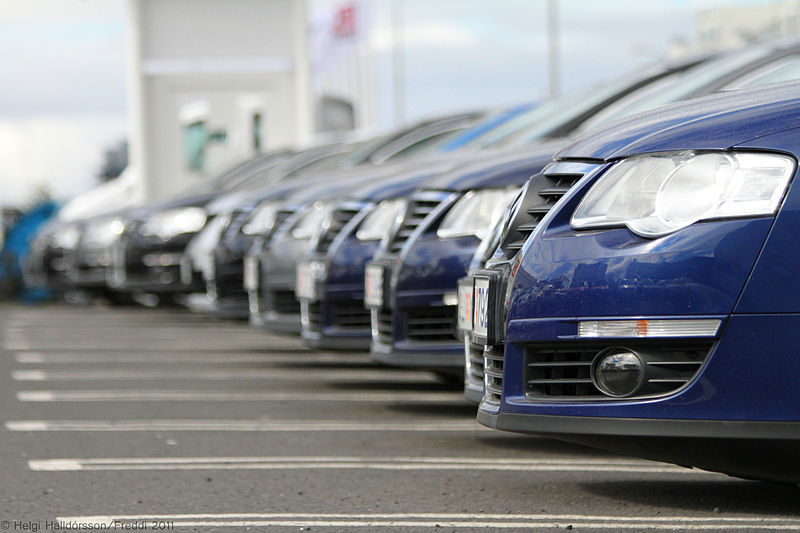The extended suspending period is an attempt to release stocks of certain models - sedans and minivans, rapidly accumulated at dealers’ stores.
"Demand for small fuel-efficient vehicles has fallen, - says Scott James, President of car dealer Mike Shaw Automotive. – This is all fault of cheap gasoline". Pickups and SUV are still popular, but sales of new cars will no longer grow in 2017, suggests James.
Demand for passenger cars in the US is slowing down after seven years of growth. Analysts expect that the annual sales in the next few years will be held at the level of about 17 million. Automakers will need to take measures against overproduction to keep prices at reasonable level.
In December, General Motors announced layoffs and plans to temporarily trim production at several factories in January. Due to a fall in demand for sedans and compact cars, the largest US automaker will dismiss 3300 employees in I quarter. In January, Ford Motor’s plant in Kansas City stopped for a week in order to prevent excess of F-150 pickups and vans. Two Canadian plants of Fiat Chrysler Automobiles NV, produce new minivan Pacifica, did not work in the first week of January.
Overall, US auto sales set a record at the end of last year. The number of cars sold in the country increased by 0.4% to 17.55 million, according to Autodata Corp.
Sales growth was driven by positive situation in the US economy, affordable loans and substantial discounts from the car manufacturers.
Sales of cars in the USA have been climbing up for already seven years in a row, which is the longest period of growth since the Second World War.
"Overall, the year was excellent, - noted Alec Gutierrez, a senior analyst at Kelley Blue Book. – However, stocks of dealers exceeded demand by the end of the year, which contributed to large discounts. "
The last year is marked by increased demand for pickups and SUVs, since low fuel prices allow Americans not to care too much about fuel efficiency.
However, experts believe that this year would set a new record thanks to rising loans rates on and an increase in the price of gasoline on the background of the expected increase in oil prices.
In December last year, car sales grew by 3.1% YoY to 1.69 million vehicles. The December index is a record since 2005.
The "Big Three" American automakers (General Motors Co., Ford Motor Co. and Fiat Chrysler Automobiles NV) exceeded forecasts for number of vehicles sold in December. So, GM's sales jumped last month by 10% to 319.1 thousand cars, instead of expected 4.4%. Ford increased its sales by 0.1% to 237.8 thousand vehicles, although experts predicted 2.1% decline in average sales. FCA’s sales fell by 10% and amounted to 192.5 thousand cars. Analysts expected even greater collapse by 14%.
source: wsj.com
"Demand for small fuel-efficient vehicles has fallen, - says Scott James, President of car dealer Mike Shaw Automotive. – This is all fault of cheap gasoline". Pickups and SUV are still popular, but sales of new cars will no longer grow in 2017, suggests James.
Demand for passenger cars in the US is slowing down after seven years of growth. Analysts expect that the annual sales in the next few years will be held at the level of about 17 million. Automakers will need to take measures against overproduction to keep prices at reasonable level.
In December, General Motors announced layoffs and plans to temporarily trim production at several factories in January. Due to a fall in demand for sedans and compact cars, the largest US automaker will dismiss 3300 employees in I quarter. In January, Ford Motor’s plant in Kansas City stopped for a week in order to prevent excess of F-150 pickups and vans. Two Canadian plants of Fiat Chrysler Automobiles NV, produce new minivan Pacifica, did not work in the first week of January.
Overall, US auto sales set a record at the end of last year. The number of cars sold in the country increased by 0.4% to 17.55 million, according to Autodata Corp.
Sales growth was driven by positive situation in the US economy, affordable loans and substantial discounts from the car manufacturers.
Sales of cars in the USA have been climbing up for already seven years in a row, which is the longest period of growth since the Second World War.
"Overall, the year was excellent, - noted Alec Gutierrez, a senior analyst at Kelley Blue Book. – However, stocks of dealers exceeded demand by the end of the year, which contributed to large discounts. "
The last year is marked by increased demand for pickups and SUVs, since low fuel prices allow Americans not to care too much about fuel efficiency.
However, experts believe that this year would set a new record thanks to rising loans rates on and an increase in the price of gasoline on the background of the expected increase in oil prices.
In December last year, car sales grew by 3.1% YoY to 1.69 million vehicles. The December index is a record since 2005.
The "Big Three" American automakers (General Motors Co., Ford Motor Co. and Fiat Chrysler Automobiles NV) exceeded forecasts for number of vehicles sold in December. So, GM's sales jumped last month by 10% to 319.1 thousand cars, instead of expected 4.4%. Ford increased its sales by 0.1% to 237.8 thousand vehicles, although experts predicted 2.1% decline in average sales. FCA’s sales fell by 10% and amounted to 192.5 thousand cars. Analysts expected even greater collapse by 14%.
source: wsj.com



















